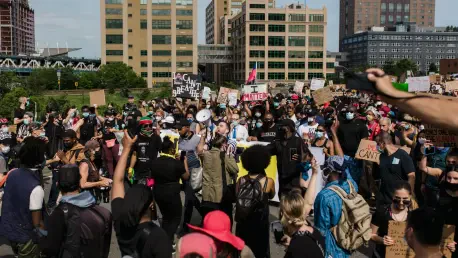Amid a backdrop of escalating tensions and federal oversight, Columbia University has decisively reinforced its stance on prohibiting protest encampments on its grounds. This move comes as the university prepares for potential pro-Palestinian protests and demonstrations criticizing its financial affiliations with companies linked to Israel. A recently issued public safety notice makes it clear that the university will not tolerate encampment activities on campus. This situation mirrors a broader challenge that many educational institutions face when attempting to balance free speech with campus safety and external pressures.
Balancing Free Speech and Institutional Regulations
Columbia’s Strict Prohibition Measures
The decision to enforce a ban on protest encampments has mobilized university administrators to intensify public safety measures. This includes increasing patrolling activities and regulating campus access in anticipation of demonstrations. Notably, this hard stance emerges after a succession of campus protests over previous years, which prompted significant responses from conservative lawmakers and led to widespread arrests of students involved. The controversy centers on the friction between the right to free speech and university policies designed to maintain order and safety.
The Trump administration, in previous years, expressed its willingness to reprimand universities perceived as failing to safeguard Jewish students adequately. In Columbia’s situation, this pressure resulted in the withdrawal of federal funding, a move that stirred accusations of exploiting antisemitism to curb dissent among educational institutions. While Columbia has endeavored to comply with select administrative mandates to regain its access to these funds—such as adjusting protest policies—doubts linger about whether these efforts will be met with funding reinstatement. The university’s predicament highlights a nationwide debate over the extent of federal intervention in university governance.
Federal Influence and Columbia’s Response
The persistent influence of federal oversight continues to shape Columbia’s response to campus dissent. The Trump administration’s stance represents a broader federal trend of exerting control over university policies perceived as non-compliant with its standards. U.S. Education Secretary Linda McMahon noted the university’s attempts to comply with new directives, yet indicated that the path to funding restoration remains uncertain. Possible legal measures and continued federal scrutiny loom over Columbia, reflecting a trend toward increased external regulation of university affairs.
Despite agreeing to modify some administrative practices, Columbia University remains vigilant in ensuring that campus protests align with safety regulations and policy norms. The complex political environment surrounding these regulations fuels ongoing discussions about the protection of academic freedom and autonomy. Should new encampments arise, Columbia officials have assured that they will take immediate steps to dismantle them and potentially arrest those who refuse to comply. These actions underscore a firm commitment to upholding university policies while navigating the intricate balance between preserving free expression and ensuring campus security.
Implications of the Ban on Campus Dynamics
Student Reactions and Campus Climate
The ramifications of Columbia’s policy enforcement have sparked a variety of responses within the campus community. For many students and activists, the university’s zero-tolerance stance on protest encampments is perceived as a barrier to their ability to engage in meaningful dialogue and express their concerns. These individuals argue that the university’s policies disproportionately restrict their ability to bring attention to international issues and effectuate change. Their anticipated protests are rooted in a call for institutional accountability and the divestment from corporations with affiliations to Israel, in light of the ongoing Israel-Hamas conflict.
The implications of these policies extend beyond immediate campus dynamics, stirring national conversations about the role of universities as platforms for political discourse and activism. The evolving landscape at Columbia reflects a microcosm of challenges faced by higher education institutions across the country. As universities grapple with reconciling free speech with regulatory compliance, they must navigate the delicate task of fostering an environment that encourages diverse perspectives while adhering to safety protocols.
Long-term Consequences and Academic Discourse
As Columbia University continues to manage the consequences of its protest policies, the broader discourse surrounding the role of academic institutions in political activism is unlikely to wane. Experts and academics have voiced concerns about the potential chilling effect on student activism and the implications for democratic engagement on campuses. The interplay between university policies, federal pressures, and student advocacy is indicative of a complex landscape that demands careful consideration and strategic response.
Looking ahead, the situation at Columbia serves as a case study for the evolving relationship between educational institutions and federal authorities. The university’s experience highlights the necessity for ongoing dialogue and collaboration to ensure that policies appropriately balance institutional priorities with the rights of students and faculty. By engaging stakeholders in meaningful discourse, Columbia and other institutions can work towards solutions that uphold the values of free expression and academic freedom in an increasingly regulated environment.
Navigating Future Challenges
Amid rising tensions and federal scrutiny, Columbia University has taken a definitive stand against allowing protest encampments on its campus. This decisive action emerges as the university anticipates possible pro-Palestinian protests aimed at voicing objections to its financial ties with entities connected to Israel. A newly released public safety statement emphasizes that the institution has a zero-tolerance policy for any encampment-related activities within its grounds. This scenario reflects a broader dilemma faced by many universities: the intricate task of upholding the principle of free expression while ensuring campus safety and navigating external influences. As institutions of higher learning find themselves at the intersection of these competing priorities, they must find ways to maintain an environment that fosters open dialogue without compromising safety or succumbing to external pressures. Balancing these critical aspects remains a complex challenge, particularly in times of heightened political and social sensitivities.









